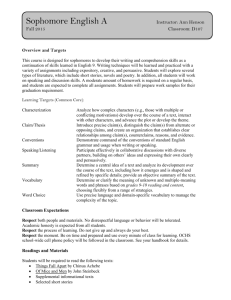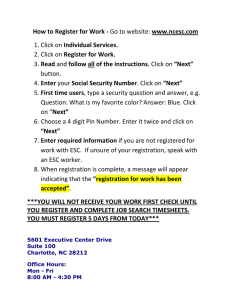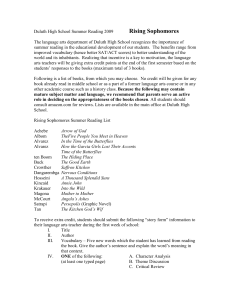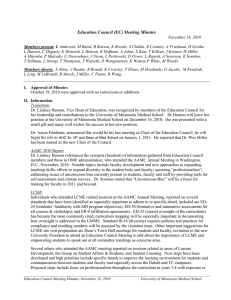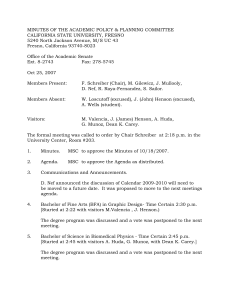Education Council (EC) Meeting Minutes Members present: January 19, 2010
advertisement
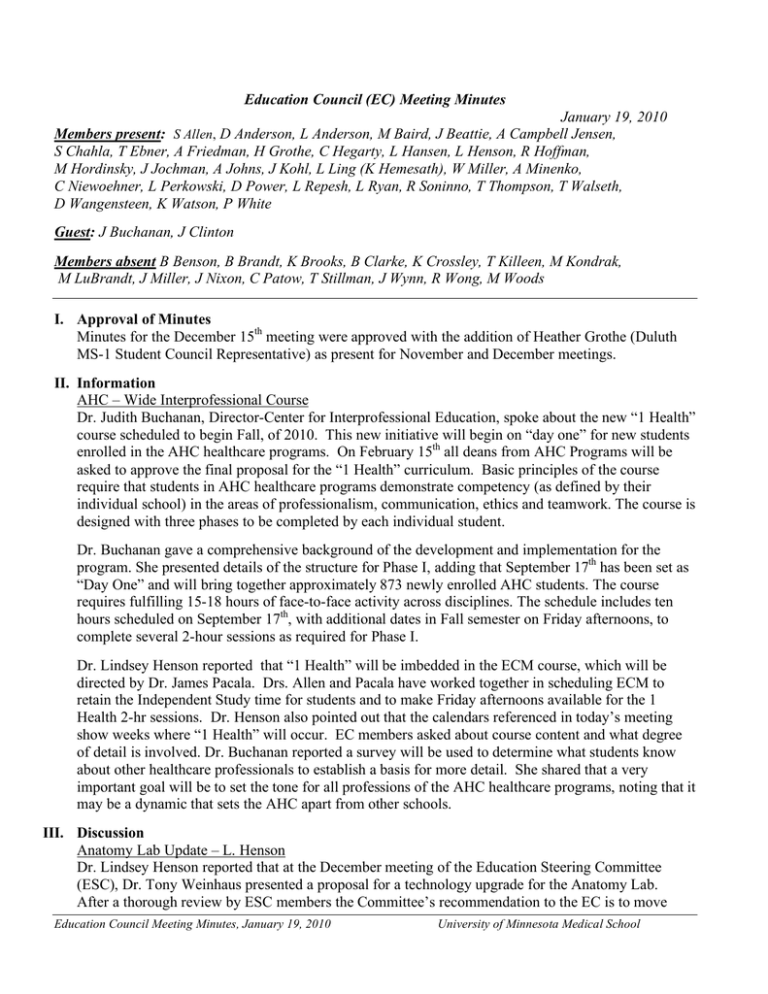
Education Council (EC) Meeting Minutes January 19, 2010 Members present: S Allen, D Anderson, L Anderson, M Baird, J Beattie, A Campbell Jensen, S Chahla, T Ebner, A Friedman, H Grothe, C Hegarty, L Hansen, L Henson, R Hoffman, M Hordinsky, J Jochman, A Johns, J Kohl, L Ling (K Hemesath), W Miller, A Minenko, C Niewoehner, L Perkowski, D Power, L Repesh, L Ryan, R Soninno, T Thompson, T Walseth, D Wangensteen, K Watson, P White Guest: J Buchanan, J Clinton Members absent B Benson, B Brandt, K Brooks, B Clarke, K Crossley, T Killeen, M Kondrak, M LuBrandt, J Miller, J Nixon, C Patow, T Stillman, J Wynn, R Wong, M Woods I. Approval of Minutes Minutes for the December 15th meeting were approved with the addition of Heather Grothe (Duluth MS-1 Student Council Representative) as present for November and December meetings. II. Information AHC – Wide Interprofessional Course Dr. Judith Buchanan, Director-Center for Interprofessional Education, spoke about the new “1 Health” course scheduled to begin Fall, of 2010. This new initiative will begin on “day one” for new students enrolled in the AHC healthcare programs. On February 15th all deans from AHC Programs will be asked to approve the final proposal for the “1 Health” curriculum. Basic principles of the course require that students in AHC healthcare programs demonstrate competency (as defined by their individual school) in the areas of professionalism, communication, ethics and teamwork. The course is designed with three phases to be completed by each individual student. Dr. Buchanan gave a comprehensive background of the development and implementation for the program. She presented details of the structure for Phase I, adding that September 17th has been set as “Day One” and will bring together approximately 873 newly enrolled AHC students. The course requires fulfilling 15-18 hours of face-to-face activity across disciplines. The schedule includes ten hours scheduled on September 17th, with additional dates in Fall semester on Friday afternoons, to complete several 2-hour sessions as required for Phase I. Dr. Lindsey Henson reported that “1 Health” will be imbedded in the ECM course, which will be directed by Dr. James Pacala. Drs. Allen and Pacala have worked together in scheduling ECM to retain the Independent Study time for students and to make Friday afternoons available for the 1 Health 2-hr sessions. Dr. Henson also pointed out that the calendars referenced in today’s meeting show weeks where “1 Health” will occur. EC members asked about course content and what degree of detail is involved. Dr. Buchanan reported a survey will be used to determine what students know about other healthcare professionals to establish a basis for more detail. She shared that a very important goal will be to set the tone for all professions of the AHC healthcare programs, noting that it may be a dynamic that sets the AHC apart from other schools. III. Discussion Anatomy Lab Update – L. Henson Dr. Lindsey Henson reported that at the December meeting of the Education Steering Committee (ESC), Dr. Tony Weinhaus presented a proposal for a technology upgrade for the Anatomy Lab. After a thorough review by ESC members the Committee’s recommendation to the EC is to move Education Council Meeting Minutes, January 19, 2010 University of Minnesota Medical School forward to determine whether there is support for the proposed upgrade, if resources can be found. She gave a brief synopsis stating the anatomy labs would have flat screen TV units and the ability to transmit the same information to all of the labs at the same time. The technology would also make it possible to transmit interesting finding for all to view. Dr. Weinhaus’ summary indicates the technology would make it possible to see pre-dissections and dissections; allowing more consistent presentations across the various groups; presentations could be captured for student use in the future (study, etc.); and TAs would have more time to help students by reducing the repetitive task of going to each dissection to describe what is taking place. Dr. Henson noted that the upgrade would benefit several professional schools whose students use our anatomy labs. The Anatomy department has a small budget for an upgrade, Dr. Paller has asked that the Education Council review the proposal and determine if the changes are of importance and do members feel the proposed changes are educationally sound. The proposal is available for EC members review; Dr. Henson reiterated the close scrutiny performed by the ESC. The estimated cost of the project is approximately $50,000 and Anatomy has $10,000 to contribute. Student Council representatives expressed concern that if the lab activities were standardized in this way, students would loose the opportunity for unique experiences that occur with different stations. Dr. Henson noted that the scheduling of labs for medical students and dental students is changing for 2010 by scheduling more labs with smaller groups, which will change the structure of how TA’s function. She didn’t feel these changes would alter students’ opportunity to move from station to station. Some labs costs may be reduced because of these changes, but Dr. Wangensteen reported that the changes are specifically to improve the course. The proposed expense also includes the annual maintenance cost required to continue efficient operation. Upon a motion duly made and seconded to endorse the recommendation of the Education Steering Committee to support moving forward with the process for the proposed Anatomy Lab Technology Upgrade: Monitors and Video Camera System for Teaching the Gross Anatomy Labs, was approved by voting members, with one member voting as opposed. Education Steering Committee Report (ESC) – L. Henson Update on Status of Revised Courses Clinical Courses – 2010-2011 As background for the ESC report, Dr. Henson referenced a set of documents being circulated and she provided a PowerPoint to highlight information regarding the status of revised courses. For academic year 09-10 course changes, the packet includes Year 1 and 2 schedules with a typical weekly schedule for the TC Campus and for the Duluth campus; and a new course proposal form. She noted that the changes detailed in these schedules will be presented to current medical students and faculty in the near future. Some changes include the following: Twin Cities Changes Year 1 Every entering student will be assigned a faculty advisor Essentials of Clinical Medicine (ECM) will replace PAP and PAS in Yr-1 3 to 4 half-days/week have been added as student independent learning time the Foundations of Critical Thinking Cases will begin, there are 7 across Yr-1 revising the exam structure and schedules, and the first institutional competency assessment called Milestone I will occur during Fall semester next year the scientific foundations courses will be integrated into four new courses; Human Disease 1, 2, 3 and 4 Year 2 Education Council Meeting Minutes, January 19, 2010 University of Minnesota Medical School for Yr-2 in 2009-10 PAP and PAS content will continue to complete the cycle for current Yr-1 Yr-2 students will have 3 half-days for independent learning per week 4 Foundations of Critical Thinking Cases revised exam structure and schedules at the end of the year there are 6 full weeks for STEP 1 study time before clinical rotations Major revisions to exam scheduled for both years relate to exams during finals week, fewer total exams and integrated exams. Some course directors are beginning to talk about changing their exam question format to short answers and other options. Duluth changes: rolling out new curriculum for Yr-1 followed by Yr-2 advising system is the learning community leaders model will continue revised course will occur throughout the year a clinical case will start at the beginning of the year, the same as the Foundations of Critical Thinking Cases Rural Health Scholars, and Social and Behavioral Medicine will be dedicated blocks of time that are interspersed with the scientific foundation courses Milestone will also be taken in Duluth, but the timing may be different Duluth has had integrated course for 12 years and will continue as organ system block courses Dr. Henson reminded Council members that the Education Steering Committee members were selected by her and Dr. Friedman, the Committee meets on Friday afternoons and includes Duluth members by video conference. For the Twin Cities courses, the review process for this year for the Twin Cities will consist of all course directors are submitting their draft course plans on the new course proposal forms. These courses do have resource needs; small group rooms, standardized patient, etc. Once all resource needs have been established the ESC will determine what can be accomplished. Two members of the ESC will be assigned to each course for a detailed review, they will present their results and recommendation which the full ESC will discuss and consider for approval. Guidelines being used were developed based on the Education Principles. For the Duluth courses the initial review is on-going and being done by the New Dr. Committee. Those recommendations will be presented, discussed and considered for approval by the ESC. Dr. Rick Hoffman added that some changes in the review schedule will occur due to recently completed reviews of courses. She reported that a recent review of the proposal for a Duluth Attachment was completed and it’s been determined that it will not be ready for implementation for the 2009-10 academic year. A pilot of an Attachment for 2 students (a metro version of RPAP) on the Twin Cities campus will begin in 2009-10. The week-by-week schedules for the proposed courses are being reviewed and there are details to work out; for Fall Semester of Year-1 materials for all of the courses have been drafted and are close to complete. For Year 2 Human Disease 1, 2 and 3 close to complete for Fall semester and the first course of Spring semester of Year 2. These are not fully detailed but enough to establish direction. Dr. Hoffman reported that he has drafts of the scientific foundations courses for Year 1 for Fall, Spring and Summer of 2009-10. There are some gaps that need to be defined. Some of the Rural Health Scholar pieces are still being developed and for the Behavioral and Social Medicine course has approximately 4 weeks of a 7 week course complete. Duluth is not modifying Year 2 courses and is just beginning to decide what their Year 2 will include; a GI course has had some development occur. Education Council Meeting Minutes, January 19, 2010 University of Minnesota Medical School Challenges of concern to the ESC: variable success with integration (teaching and integrated exams) teaching methods (active learning) assessments – formative and summative o level of effort by students o level of feedback from faculty independent learning time Duluth students have provided positive feedback and Heather Grothe noted concern that students will not study or feel there is a level of importance if the formative feedback isn’t graded, is unfounded. She shared that at UMD students often use the quizzes several time over as tools to test their knowledge and as part of their study guides. Dr. Henson announced that in keeping with the need to inform students, course directors, those from Duluth and others about the process and the changes being made, Drs. Cerra and Paller have committed to a session for an open forum on Tuesday, January 26th at 5:30 pm. in B620. An announcement will be sent to everyone. She reported a deadline for final approval of overall curriculum plans for both campuses by the EC is set for April, which means that the individual course reviews by ESC will be completed in March. A joint Curriculum Retreat is scheduled for Friday, May 21st; which will provide the opportunity to showcase the upcoming curriculum plans. There will also be faculty development sessions to select from during the day. She announced that the April EC meeting will take place on Tuesday, April 27th to accommodate a presentation from an Associate Dean whose medical school has experienced a probationary status resulting from their LCME site visit. He will share details from their review and offer information about their experience. With regard to the current status of planning, Dr. Henson asked for feedback and questions from EC members. Dr. Ebner expressed the need to develop a standard process for handling the resource requests that will be part of preparation for the revised courses. Dr. Friedman stated the unique circumstances that are part of the Anatomy lab upgrade and agreed that most of the upcoming requests will be routine. Dr. Henson agreed that most resource requests can be determined by the ESC. Clinical Course Update 2010-11 Dr. Cullen Hegarty reported the CEC has been working on several projects, which include a review of Graduation Competencies; review of the Attachment proposals for Duluth and the Twin Cities; work on changes to evaluation processes and documentation for courses, and matching clinical experiences with competencies to determine where the experiences occur. Dr. Hegarty announced there will be no changes in required clerkships. Review of Graduation Competencies has helped to reveal where procedures can be achieved; highlighting Emergency Medicine (EM) as integral in providing access to a broad spectrum of procedures. Dr. Henson reiterated the competency review has resulted in identifying an essential need for the EM rotation to teach procedures required for graduation. Dr. Aaron Friedman asked EC members to consider the importance of retaining the current set of required clerkships, specifically continuation of the EM rotation. Upon a motion duly made and seconded a recommendation for Emergency Medicine required rotation to continue in its current format was passed. Dr. Hegarty reported that a review of electives will begin soon and 3 week electives may eventually change to 2 or 4 week rotations. He also noted that work will begin on how and where integration of scientific foundations and clinical education fit best with curriculum revisions. The next Education Council meeting will be held on February 16, 2009 Approved by Education Council members, February 16, 2010 Education Council Meeting Minutes, January 19, 2010 University of Minnesota Medical School
